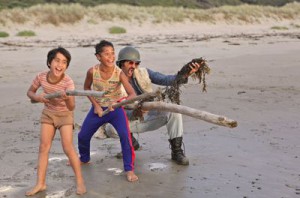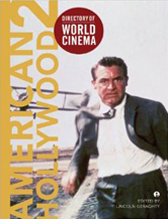
REVIEW: Boy
Taika Waititi’s Boy opens with an illuminating quote from E.T.: The Extra-Terrestrial (1982) – “You could be happy here…we could grow up together”. Situating the film within the mid-1980s, the reference to Steven Spielberg’s seminal work also provides an insight into the emotional longing of Boy’s central character, an imaginative eleven year-old living in the New Zealand coastal town of Waihau Bay.
 ‘Boy’ as he is nicknamed, lives with his younger brother Rocky, a houseful of cousins and his Nan. He spends his time ogling his schoolyard crush, Chardonnay, and daydreaming about his twin idols: his absent father, Alamein (whom he imagines in the guise of war hero, samurai warrior and prison escapee) and Michael Jackson, whose images adorn his bedroom wall.
‘Boy’ as he is nicknamed, lives with his younger brother Rocky, a houseful of cousins and his Nan. He spends his time ogling his schoolyard crush, Chardonnay, and daydreaming about his twin idols: his absent father, Alamein (whom he imagines in the guise of war hero, samurai warrior and prison escapee) and Michael Jackson, whose images adorn his bedroom wall.
But like the stargazing Elliott (the socially disconnected protagonist of E.T.), Boy’s fantasies register a deeply felt paternal absence. Having lost his mother in childbirth, an event that the introspective Rocky feels perpetually responsible, Boy’s fantastical stories serve as a veil for his unpalatable home truths. Like Sarah Watts’ Look Both Ways (2005), where the use of animation offered a glimpse of her characters’ otherwise unrepresentable traumas, the hand-drawn and fantasy sequences in Boy testify to similar unseen and unresolved tensions.
However, when Alamein unexpectedly returns to the family home with two fellow ex-cons in tow, Boy’s fantasies about his father are increasingly confronted with a less-than-heroic reality. After the initial joy of his father’s reappearance and the prospect of his liberation from Waihau Bay, Boy gradually suspects that Alamein may be more interested in reclaiming a cache of stolen money buried on the property, than in re-establishing his familial duties.
It’s perhaps not surprising, given the film’s coming-of-age narrative, that Michael Jackson features so heavily in Boy’s fantasies. Like a modern-day Peter Pan, Jackson configured his pop-star persona around an image of perpetual boyhood: the man who never had to mature. Pointedly, as the relationship between Boy and Alamein develops, Waititi’s film cleverly alludes to the fact that of the pair, it may be the father and not son who is most in need of growing up.
 The success of Boy is due in no small part to the performances of the main cast, particularly newcomers James Rolleston (as Boy) and Te Aho Eketone-Whitu (Rocky) who carry their roles with an effortless charisma and sensitivity. Taika Waititi (who also stars as Alamein) deserves high praise for his script and direction here. In only his second feature (his previous work was the enjoyable Eagle vs. Shark), Waititi imparts upon Boy a delicate balance of humour and sadness which few experienced directors could sustain.
The success of Boy is due in no small part to the performances of the main cast, particularly newcomers James Rolleston (as Boy) and Te Aho Eketone-Whitu (Rocky) who carry their roles with an effortless charisma and sensitivity. Taika Waititi (who also stars as Alamein) deserves high praise for his script and direction here. In only his second feature (his previous work was the enjoyable Eagle vs. Shark), Waititi imparts upon Boy a delicate balance of humour and sadness which few experienced directors could sustain.
That Boy was nominated for a Grand Jury Prize at this year’s Sundance Film Festival, and claimed awards at the Berlin, Melbourne and Sydney International Film Festivals merely gestures at the quality of filmmaking in evidence here. One of the most genuinely moving and rewarding films of 2010.





This is a really good read, Must admit that you are one of the best bloggers I ever saw. Thanks for posting this informative review.
Hi buddy, your blog’s design is simple and clean and I like it. Your blog posts are superb. Please keep them coming. Greets!!!
what the other two said…
Your review gives weight to what will be self evident to quality movie lovers and should be to movie houses – this is a “top shelf” movie that deserves broad accessibility to all. I agree that it deserves all the plaudits and awards that it receives. Do not miss it!!